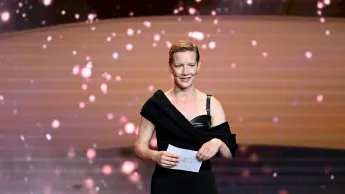Drama, sci-fi & comedy: German cinema around the world
- 2024-10-28
- Luca Rehse-Knauf
- Comment

Around a century after the director Fritz Lang wrote cinematic history with a German production and the world’s first science fiction film , German films and series continue to influence styles worldwide and attain international success. From time-travel thrillers and romantic comedies to war dramas – we highlight what makes German cinema so diverse and successful.
The diversity of German cinema today
More than 3,000 German films have been shown in cinemas since the year 2000, encompassing a broad spectrum of topics and styles. Some genres have come to particularly characterise recent German film history. Culture-clash comedies by authors such as Bora Dagtekin () and German-Turkish cinema by directors like Fatih Akın () tell stories of people caught between two worlds in Germany, a country shaped by migration.
Award-winning: from small film festivals to the Oscars
German films are loved by cinemagoers worldwide and regularly reap awards – both at and at the big-name festivals. Maren Ade’s film starring Sandra Hüller premiered at the 69th Cannes Film Festival in 2016, catapulting modern German cinema into the international limelight. Alongside numerous nominations, Germany has also won three Oscars for best foreign language film or best international feature film since the year 2000. These were awarded to (2001), (2006) and All Quiet on the Western Front (2022 ).
All quiet on the Western Front
Series made in Germany: time travel and school romance
German series have also made great strides in recent years and regularly win over international audiences. One example is The Empress, a fascinating depiction of the life of Empress Elisabeth of Austria – known for short as Sisi – that had viewers spellbound for over 56 million hours. This makes it the most successful German series and puts it in the top two percent of all Netflix content. The mystery series Dark did especially well abroad and was named the streaming service’s best production by renowned online portal “Rotten Tomatoes”.
Besides historical dramas and time-travel thrillers, German series makers also have some more frivolous themes in their repertoire. , a series based on the Save Me trilogy of novels, ranked number one in 120 countries on streaming service Amazon Prime. Its gripping plot lines and engaging romantic twists appeal to young adults in particular. Imposing film locations such as the neogothic Marienburg Castle near Hanover provide a visually stunning backdrop. Other German series that have achieved global success are , and .
Charismatic stars who are no strangers to the red carpet
Of course, German cinema’s success comes courtesy in part of stars of truly global calibre. for instance is currently one of Germany’s most-fêted actors. She has won both the German and European Film Awards, France’s César Award and the Berlinale’s Silver Bear. She was nominated for an Oscar for best actress for her role in the legal drama Anatomy of a Fall. Zone of Interest, a cinema film that likewise stars Hüller, was also nominated for an Oscar for best picture and garnered her further international attention.
Zone of Interest
Yet behind the glitter and glamour of the red carpet it is not only actors who are in the limelight; it is the creative individuals behind the scenes who play just as important a part in a film’s success. The films made by German auteur Wim Wenders have earned him numerous international accolades, including most recently an Oscar nomination for the German-Japanese co-production Perfect Days. It should not be forgotten either that the soundtracks to many major films were written by German composers. Hans Zimmer, a composer born in Frankfurt am Main, runs a production company that created the soundtracks to such famous films as Pirates of the Caribbean, Inception and Dune .
Promoting film culture
Funding to boost the worldwide presence and relevance of German cinema also plays a key role in the success of well-known German hits. The German Federal Film Fund pumps around 60 million euros into the German movie industry each year. Festivals such as Filmfest München, the Berlin International Film Festival – or for short – and the Max Ophuels Film Festival in Saarbrücken make Germany a paradise for cinemagoers that also attracts international stars.
Young filmmakers are trained at academies in Babelsberg, Berlin, Hamburg, Cologne, Munich and Ludwigsburg. Institutions such as the Goethe-Institut and the agency German Films likewise help popularise German cinema by distributing films and organising screenings. This allows cineasts and budding aficionados to watch the latest hot releases or re-screenings of classics like Metropolis no matter where they are in the world.
